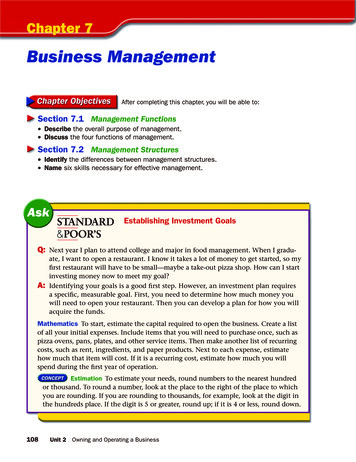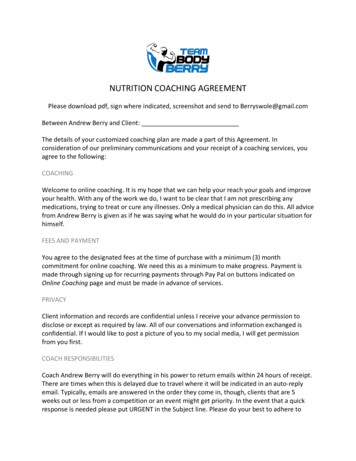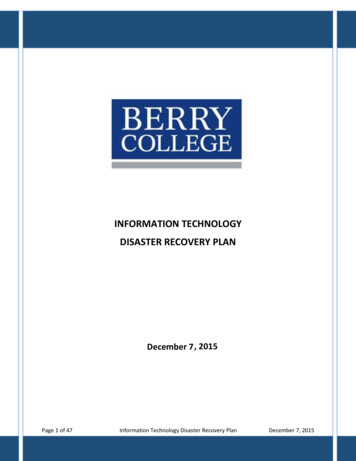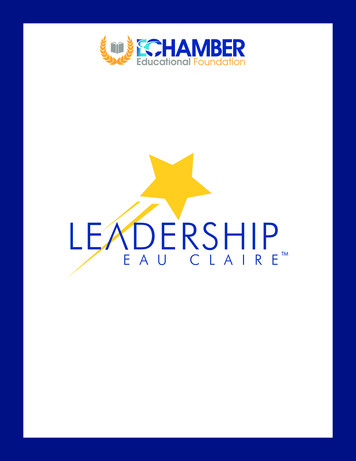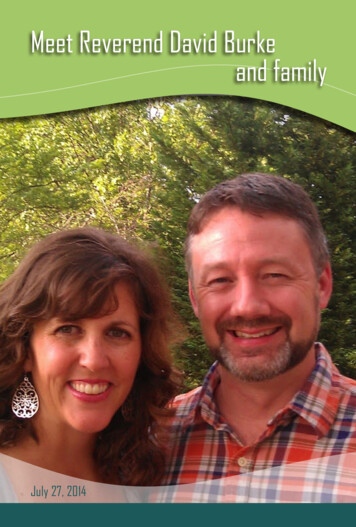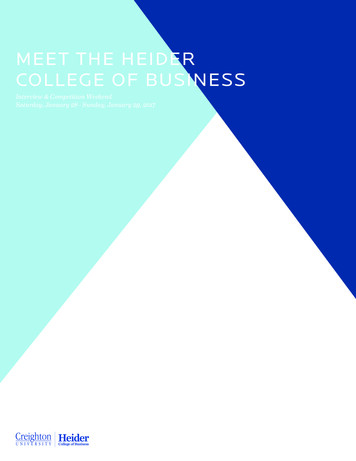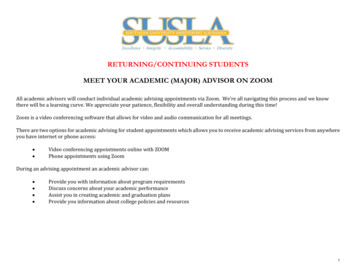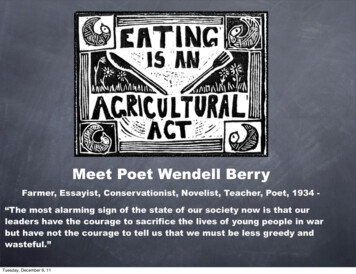
Transcription
Meet Poet Wendell BerryFarmer, Essayist, Conservationist, Novelist, Teacher, Poet, 1934 “The most alarming sign of the state of our society now is that ourleaders have the courage to sacrifice the lives of young people in warbut have not the courage to tell us that we must be less greedy andwasteful.”Tuesday, December 6, 11
“How to Be a Poet”(to remind myself)1Make a place to sit down.Sit down. Be quiet.3You must depend uponAccept what comes from silence.affection, reading, knowledge,Make the best you can of it.skill--more of eachOf the little words that comethan you have--inspiration,out of the silence, like prayerswork, growing older, patience,prayed back to the one who prays,for patience joins timemake a poem that does not distrubto eternity. Any readers’the silence from which it came.2who like your poems,doubt their judgment.Breathe with unconditional breaththe unconditioned air.Shun electric wire.Communicate slowly. Livea three-dimensioned life;stay away from screens.Stay away from anythingthat obscures the place it is in.There are no unsacred places;there are only sacred placesand descrated places.Tuesday, December 6, 11
Wendell Berry (born August 5, 1934) is a United States poet, novelist,essayist, philosopher and farmer. His most well known book, TheUnsettling of America, provides a classic critique of industrialagriculture which is foundational to today's agrarianism.Berry was born in Henry County, Kentucky in 1934, the first of fourchildren born to John and Virginia Berry. His father was a tobaccofarmer, and as a young man Berry wanted to farm tobacco as well.He attended secondary school at Millersburg Military Institute, andthen pursued a B.A. in English at the University of Kentucky atLexington. In 1957 he completed a Master’s degree in English, alsoat the University of Kentucky; that same year, he married TanyaAmyx.His poetry is simple and resonant, a kind of plainsong, usuallysimilar in tone to Jane Kenyon but occasionally veering into theterritory of Walt Whitman or Biblical prophets. Much of his nonfictionserves as defense of farming and the connectedness he perceives asinherent in rural life.Tuesday, December 6, 11
In 1958 Berry received a Wallace StegnerFellowship, which he used to study creativewriting at Stanford University. In 1960 he andTanya returned to the 250 acre (1 km²) Berryfamily farm.After being granted a Guggenheim fellowship,Berry took his family to Europe in 1961. In1965 he returned to Kentucky, where hetaught for several decades at the Universityof Kentucky. Today he lives and farms on thefamily farm at Port Royal, Kentucky,alongside the Kentucky River, not far fromwhere it flows into the Ohio.He is a prolific author, with fourteen books ofpoems, sixteen volumes of essays, andeleven novels and short story collections tohis name. His writing is rooted in the notionthat one's work ought to be connected withone's place. Much of his nonfiction serves asdefense of farming and the connectedness heperceives as inherent in rural life.Tuesday, December 6, 11“A corporation,essentially, is a pile ofmoney to which a numberof persons have soldtheir moral allegiance.”― Wendell Berry
“We have lived our lives by theassumption that what was goodfor us would be good for theworld. We have been wrong. Wemust change our lives so that itwill be possible to live by thecontrary assumption, that whatis good for the world will begood for us. And that requiresthat we make the effort to knowthe world and learn what isgood for it.”Tuesday, December 6, 11
President Obama awarded the NationalMedals of Arts and the National Medalsof Humanities today (March 2, 2011) atthe White House, an event that wasalso streamed on the White Housewebsite.“We are here today because these menand woman were not alone in thestruggle,” President Obama said in hisopening remarks. ”There are peoplehere whose books poetry and works ofhistory shaped me They helped metake risks that I wouldn’t have taken.”Tuesday, December 6, 11
He attended secondary school at Millersburg Military Institute, and then pursued a B.A. in English at the University of Kentucky at Lexington. In 1957 he completed a Master’s degree in English, also at the University of Kentucky; that same year, he married Tanya Amyx. His po

